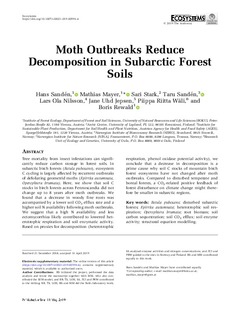Moth Outbreaks Reduce Decomposition in Subarctic Forest Soils
Sandén, Hans; Mayer, Mathias; Stark, Sari; Sandén, Taru; Nilsson, Lars Ola; Jepsen, Jane Uhd; Wäli, Oiippa Ritta; Rewald, Boris
Peer reviewed, Journal article

View/
Date
2019Metadata
Show full item recordCollections
- Scientific publications [1392]
Original version
10.1007/s10021-019-00394-6Abstract
Tree mortality from insect infestations can significantly reduce carbon storage in forest soils. In subarctic birch forests (Betula pubescens), ecosystem C cycling is largely affected by recurrent outbreaks of defoliating geometrid moths (Epirrita autumnata, Operophtera brumata). Here, we show that soil C stocks in birch forests across Fennoscandia did not change up to 8 years after moth outbreaks. We found that a decrease in woody fine roots was accompanied by a lower soil CO2 efflux rate and a higher soil N availability following moth outbreaks. We suggest that a high N availability and less ectomycorrhiza likely contributed to lowered heterotrophic respiration and soil enzymatic activity. Based on proxies for decomposition (heterotrophic respiration, phenol oxidase potential activity), we conclude that a decrease in decomposition is a prime cause why soil C stocks of mountain birch forest ecosystems have not changed after moth outbreaks. Compared to disturbed temperate and boreal forests, a CO2-related positive feedback of forest disturbance on climate change might therefore be smaller in subarctic regions.
